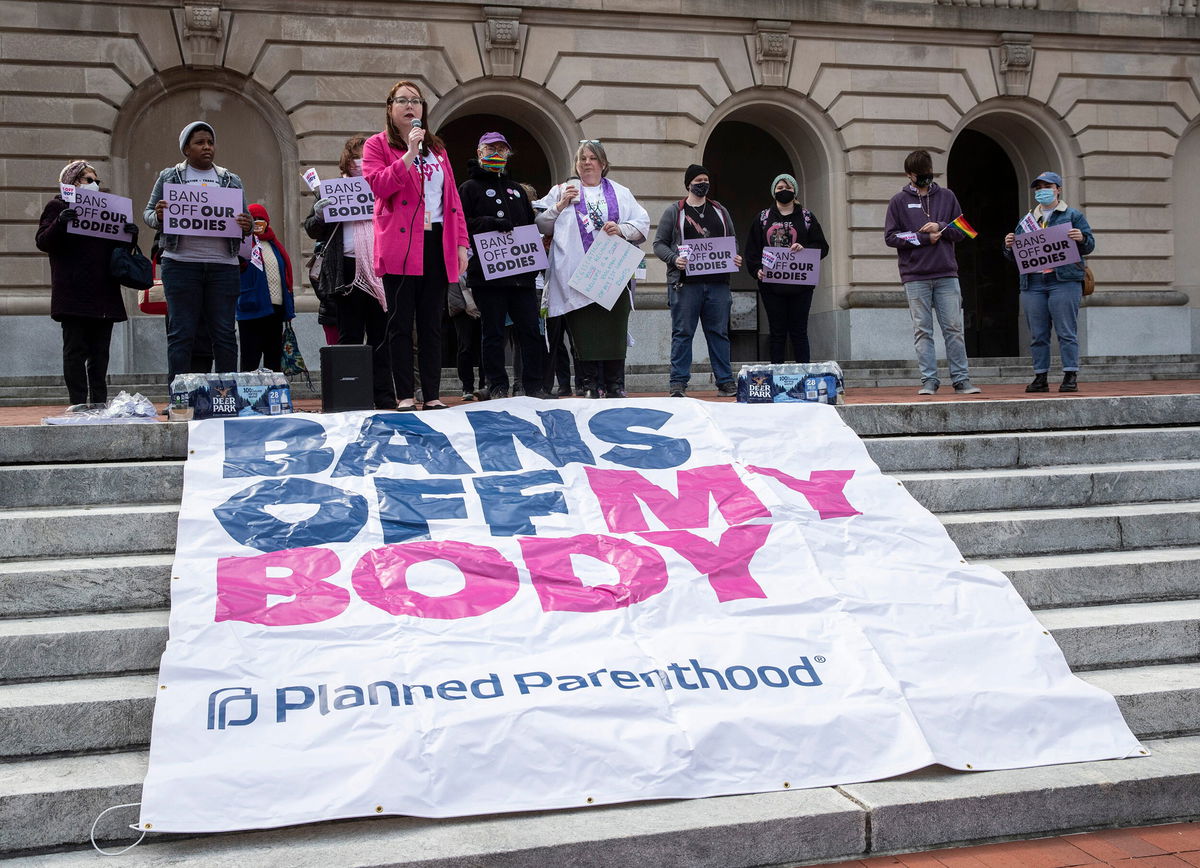Federal judge temporarily blocks new Kentucky abortion law from being enforced

Protesters gather in front of the Kentucky State Capitol in Frankfort over House Bill 3 on March 29. A federal judge on April 21 temporarily blocked a broad Kentucky abortion law
By Veronica Stracqualursi, CNN
A federal judge on Thursday temporarily blocked a broad Kentucky abortion law, which includes a 15-week ban, from being enforced.
The law, HB 3, which had gone into effect last week, bans most abortions after 15 weeks of pregnancy, restricts access to medication abortion and enforces more requirements for minors to obtain abortions in the state.
HB 3 requires Kentucky’s state-operated health agency, the Cabinet for Health and Family Services, to create new forms, including a document for providers to report abortions performed in Kentucky and a document to obtain informed consent before providing medication abortions. The law also creates a certification program that governs access to medication abortions and mandates that the drugs can only be given by “qualified physicians,” but does not outline how physicians are to register.
Planned Parenthood Great Northwest, Hawaii, Alaska, Indiana, and Kentucky, Inc. swiftly filed a challenge to the law, arguing that compliance was “impossible” since the bill went into effect immediately and state agency forms and processes were not yet available.
The law “imposes immediate potential for criminal penalties, civil liability … and potential loss of facility and medical licenses due to non-compliance,” Planned Parenthood wrote in its complaint, adding: “The result is an unconstitutional ban on abortion in Kentucky because Plaintiff (as well as the other abortion-providing clinic in Kentucky) must cease providing abortions immediately.”
Attorney General David Cameron, a Republican who was a defendant in the case, had argued that Planned Parenthood did not need to use or submit the required forms until the Cabinet created them, but could comply with the law’s requirement by “simply reporting the required information in a manner it finds expedient.”
US District Judge Rebecca Grady Jennings of the Western District of Kentucky did not rule on the constitutionality of the law itself but agreed with Planned Parenthood that additional time was necessary to “specifically determine which individual provisions and subsections are capable of compliance.”
In the meantime, the Cabinet for Health and Family Services can proceed with creating the programs and forms established under the new law. Thursday’s ruling means that Planned Parenthood’s clinic in Louisville will start providing abortions again, said Nicole Erwin, a spokeswoman for the clinic.
The restraining order will remain in effect no longer than 14 days or until an injunction hearing is scheduled or an extension granted.
Rebecca Gibron, the CEO of the Planned Parenthood chapter that sued, called Jennings’ ruling a win and promised to keep fighting the new law.
“We’re prepared to fight for our patients’ right to basic health in court and to continue doing everything in our power in ensure abortion access is permanently secured in Kentucky,” Gibron said.
Cameron, meanwhile, said he was “disappointed” in the ruling but would continue to defend the law.
The new Kentucky law is similar to Mississippi’s 15-week abortion ban that is currently before the US Supreme Court.
Planned Parenthood runs one of the only two clinics in Kentucky in which abortions are performed.
The American Civil Liberties Union and the ACLU of Kentucky, on behalf of the other clinic, EMW Women’s Surgical Center, are separately suing to block the law.
HB 3 went into effect after Kentucky’s Republican-controlled legislature overrode Democratic Gov. Andy Beshear’s veto of the bill.
The-CNN-Wire
™ & © 2022 Cable News Network, Inc., a WarnerMedia Company. All rights reserved.
CNN’s Amanda Musa contributed to this report.
